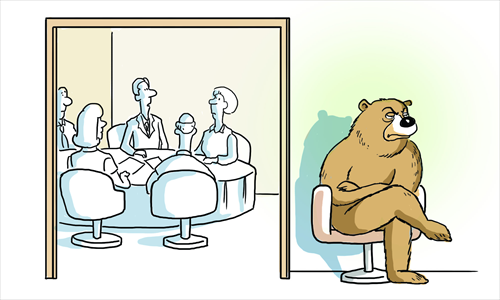HOME >> OP-ED
Freezing out Russia will prove pointless
By Clifford A. Kiracofe Source:Global Times Published: 2014-3-27 0:08:02

Illustration: Liu Rui/GT
The exclusion of Russia from the G8 may well signal a new phase of Cold War against Moscow. Western leaders are falling all over themselves saber rattling on the Ukraine crisis and underscoring the role of NATO to defend against the proverbial Russian bear.
The G8 issue should be placed into the context of Washington's overall geopolitical strategy. This strategy seeks to maintain US and Western hegemony through NATO and through the enforcement of the rules and norms of the so-called Western order by force if necessary.
The strategy includes the strategic encirclement of the Eurasian landmass, the breaking up of BRICS, and the breaking up of the special relationship between Russia and China.
These longstanding strategic objectives rest on the 20th century geopolitical concepts of Halford Mackinder, a British strategist, and Nicholas Spykman, a Dutch-American strategist.
There is clearly no intention to build a new type of major power relations with Russia as the West's Ukraine project demonstrates.
By now it is quite clear that the long planned regime change in Ukraine via coup d'etat was the result of intensive overt and covert cooperation between the US and some western and eastern European countries.
Victoria Nuland, US assistant secretary of state for Europe and Central Asia, boasted that the US has invested $5 billion in "promoting democracy" in Ukraine. A look at her career track reveals the deep influence of the hawkish neoconservatives in both Democratic and Republican administrations.
During the Bill Clinton administration, Nuland served as deputy director for Soviet Union affairs at the State Department. During the George W. Bush administration, she served as the principal deputy foreign policy adviser to then vice president Dick Cheney. Then she was US ambassador to NATO.
In the Obama administration, she was special envoy for Conventional Armed Forces in Europe, then a State Department spokesperson, and was later appointed to her current position.
The Obama administration's Russia policy shows continuity with the Clinton and Bush policies. A sincere and constructive "reset" of US-Russian relations was never really in the cards given Washington's strategic mindset.
What are the implications of the exclusion of Russia from the G8? The fact is that G8 issues are already dealt with in the format of the G20, making the G8 club essentially redundant in today's international system.
The present G7 exclusion of Russia does not affect the G20 which is the authoritative consensus group today. Russia will simply play its role within the G20 format rather than the G8 format.
Will the Ukraine crisis lead to war? While a Sarajevo-like situation triggering a regional or world war is always a possibility, so far this has been avoided. But continued Western provocations will raise tensions rather than deescalate tensions.
While western European countries are somewhat cautious, some eastern European countries are not. Some eastern European countries appear to have been deeply involved with the regime change in Ukraine and could drag reluctant western European countries into a quagmire in the heart of Europe.
The George W. Bush administration placed great emphasis on the eastern European countries as Washington's pliable new vassals. During the Iraq crisis, then secretary of defense, Donald Rumsfeld, pointedly criticized the "Old Europe" of France and Germany and praised the march of NATO eastward. The same thinking circulates today in Washington.
It remains to be seen how much impact the Ukraine crisis will have on the West's interaction with and cooperation with Russia. While economic interaction is the most salient issue, there are many other issues relating to cooperation in such areas as counterterrorism and counter-narcotics.
The West's exclusion of Russia from the G8 is counterproductive and shows the world that the Cold War may never have really ended.
The author is an educator and former senior professional staff member of the Senate Committee on Foreign Relations. opinion@globaltimes.com.cn
Posted in: Viewpoint